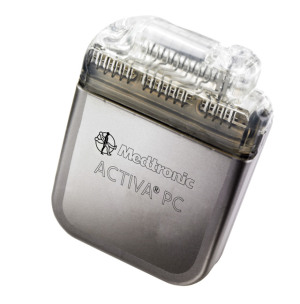por
Lauren Dubinsky, Senior Reporter | December 10, 2015

Medtronic's Activa Deep Brain
Stimulation system
Medtronic plc announced today that its Activa Deep Brain Stimulation (DBS) systems are now approved by the FDA for full-body MR imaging under specific conditions. These DBS systems are currently the only ones approved for this indication.
DBS therapy involves a surgically implanted medical device that delivers mild electrical pulses to precisely target areas of the brain. In the U.S., Europe and other countries, it’s approved for the treatment of essential tremor, Parkinson’s disease and chronic intractable primary dystonia.
The DBS systems consist of a lead, which is a thin, insulated wire, that’s inserted through a small opening in the skull and implanted in the brain, and the tip of the lead is placed within the targeted brain area. The neurostimulator, also known as the “battery pack,” is usually implanted under the skin near the collarbone and the extension is an insulated wire that connects the lead and the neurostimulator.



Ad Statistics
Times Displayed: 74494
Times Visited: 5313 MIT labs, experts in Multi-Vendor component level repair of: MRI Coils, RF amplifiers, Gradient Amplifiers Contrast Media Injectors. System repairs, sub-assembly repairs, component level repairs, refurbish/calibrate. info@mitlabsusa.com/+1 (305) 470-8013
About 43,000 patients in the U.S. have already received DSB therapy with Medtronic’s systems. A report from IMV Medical Information Division, Inc. found that seven out of 10 patients with movement disorders who are eligible for DBS therapy might require an MR exam within 10 years of receiving the device.
The MR scans are important because they allow the physicians to identify and monitor health conditions in this patient population including stroke, dementia, movement disorders, brain tumors, seizures, disease of the spine, cancer, musculoskeletal issues and cardiac issues. X-ray and CT can be used, but physicians prefer to avoid exposing patients to radiation.
Since 2002, the FDA has allowed patients with Medtronic’s DBS to undergo head MR scans at a low radiofrequency (RF) power limit and if the DBS system is turned off before the exam. But with the approval of the full-body capability, the MR RF power limits can be increased, which leads to better image quality, faster scans and wider coverage.
In addition, when the DBS system is programmed to appropriate stimulation settings and other conditions have been met, the patients can continue to receive therapy while they are undergoing the exam.
Medtronic put the Activa DBS systems through rigorous testing with advanced electromagnetic modeling tools to ensure that they are safe to be used on patients. They were tested on 10 million simulated patient scans across more than 38,000 different implant conditions.
In its portfolio, Medtronic also has MR-conditional pacemakers called the Revo MRI SureScan Pacemaker and the Advisa SR MRI SureScan single-chamber pacemaker. The company spent over 10 years conducting research and performing testing to design the Revo MRI SureScan Pacemaker so that patients can have access to MR scans under specific conditions.
St. Jude Medical has a DBS system on the market called the Brio Neurostimulator, which is FDA approved for Parkinson’s and essential tremor, but it is not MR conditional. Boston Scientific also has a DBS system called the Vercise PC Deep Brain Stimulation System, but it's also not compatible with MR and currently does not have FDA approval.

